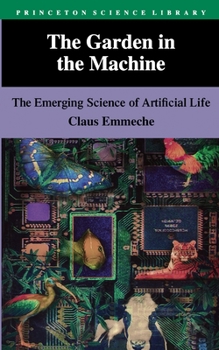The Garden in the Machine: The Emerging Science of Artificial Life
Select Format
Select Condition 
Book Overview
What is life? Is it just the biologically familiar--birds, trees, snails, people--or is it an infinitely complex set of patterns that a computer could simulate? What role does intelligence play in separating the organic from the inorganic, the living from the inert? Does life evolve along a predestined path, or does it suddenly emerge from what appeared lifeless and programmatic? In this easily accessible and wide-ranging survey, Claus Emmeche outlines many of the challenges and controversies involved in the dynamic and curious science of artificial life. Emmeche describes the work being done by an international network of biologists, computer scientists, and physicists who are using computers to study life as it could be, or as it might evolve under conditions different from those on earth. Many artificial-life researchers believe that they can create new life in the computer by simulating the processes observed in traditional, biological life-forms. The flight of a flock of birds, for example, can be reproduced faithfully and in all its complexity by a relatively simple computer program that is designed to generate electronic "boids." Are these "boids" then alive? The central problem, Emmeche notes, lies in defining the salient differences between biological life and computer simulations of its processes. And yet, if we can breathe life into a computer, what might this mean for our other assumptions about what it means to be alive? The Garden in the Machine touches on every aspect of this complex and rapidly developing discipline, including its connections to artificial intelligence, chaos theory, computational theory, and studies of emergence. Drawing on the most current work in the field, this book is a major overview of artificial life. Professionals and nonscientists alike will find it an invaluable guide to concepts and technologies that may forever change our definition of life.
Format:Hardcover
Language:English
ISBN:0691033307
ISBN13:9780691033303
Release Date:July 1994
Publisher:Princeton University Press
Length:216 Pages
Weight:0.95 lbs.
Dimensions:0.8" x 5.0" x 8.0"
Customer Reviews
3 ratings
A very good book
Published by Thriftbooks.com User , 21 years ago
Emmeche's slim book is a great intro for those interested in this new & theoretical science. It is well-written, with a constant eye towards the philosophical side of the emerging discipline of "artificial life". Crucial to this discipline is the idea that "form"--a self-organized pattern in space--takes precedence over the material substrate of which it is made. As Emmeche emphasizes throughout his narrative, computer scientists have gained better results at modeling artificial life with the "bottom-up" approach (in contrast to "top-down" attempts to legislate global behavior of these systems). This is a good book for those who might want to study the amazing work of Chris Langton and Stuart Kaufmann. Those chapters in particular are excellent.
Games of Computer Life
Published by Thriftbooks.com User , 23 years ago
Great little introduction to the world of artificial life. Short, but to the point, and without the exaggerated claims of many of its proponents trying to use these models to justify Darwinian theories, the book gives a glimpse of the main elements of the field. We must be seeing the evolutionary theories of the future, the first real ones, being born here.
Great introduction to Artificial Life
Published by Thriftbooks.com User , 23 years ago
"If life is information, and information is an answer...What was the question?" In this insightful piece of work danish theoretical biologist Claus Emmeche introduces Artificial Life as a true interdisciplinary scientific subject and discusses the topic from both a scientific and philosophical point of view. Using a language that's easy to understand but also complete the book deals with artificial (computer-simulated) life and its relationship with areas such as auto-organization, emergence, cellular automata, chaos theory, fractals and artificial intelligence. Although not very extense the book features 7 chapters with 170 excellent references to the "creme" of the subject which are alone worth its price. Computer geeks (such as me) will undoubtly suffer the lack of any source code or companion software.






